In their quest to find more natural and efficient ways to increase dopamine in the brain, many people turn to ingesting small amounts of cannabis. Low doses of tetrahydrocannabinol (THC) might boost our dopamine levels.
To learn more about tetrahydrocannabinol and its effects, read our extensive guide to THC.
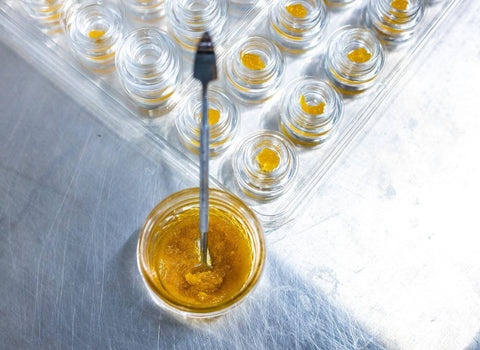
Delta 9 THC could potentially keep dopamine levels in our brain in balance. Our low-dose Delta 9 gummies have no negative effects on our health. They are a reliable and effective way to raise dopamine levels.
Not sure what Delta 9 THC is? Read up on our guide to Delta 9 THC and all its healing properties.
The Importance of Dopamine
Dopamine is a neurotransmitter, a brain chemical produced by a group of nerve cells in our brain. Its main job is to constantly send messages between neurons and other parts of the brain.
It is also responsible for feelings of pleasure, satisfaction, and motivation. When we do something that makes us feel good—eat our favorite food, win a game, or have sex—we get a surge in the dopamine levels, which is partly why people get addicted to certain pleasures.
Dopamine Functions
Although we often think of dopamine as the “feel-good” hormone that makes us happy, this neurotransmitter affects some of our physical functions and regulates important brain activities, such as:
- Sleep
- Mood
- Heart rate
- Lactation
- Control of nausea and vomiting
- Pain processing
- Movement
Not Too Much and Not Too Little Dopamine
Balanced dopamine levels are important for our day-to-day happiness, motivation, focus, and overall well-being.
- Excessive dopamine levels can disrupt sleep and lead to impulsive or compulsive behaviors like aggression, addiction, binge-eating, gambling, and attention deficit hyperactivity disorder (ADHD).
- Low levels of dopamine in the brain might leave a person feeling unmotivated, sad, and sleepy. Additionally, low dopamine affects memory and concentration. Dopamine deficiency can lead to clinical depression and problems with memory.
For optimal mood and health, we want a Goldilocks level of dopamine. Low doses of cannabis may be able to help us achieve it.
Causes of Dopamine Deficiency
Dopamine is produced by the adrenal gland, a small, hat-shaped gland attached to our kidneys. Dopamine is also released by the hypothalamus in the brain. Some medical experts think that an injury to or a malfunction of these dopamine-producing areas could lead to a deficiency.
Problems with the nerve cell receptors that receive and send messages between neurons could also cause low levels of dopamine. However, the exact reason why dopamine levels in our bodies decline is still unknown.
The symptoms of a dopamine deficiency often depend on the cause. Many of these overlap with those of anxiety, depression, attention deficit hyperactivity disorder, post-traumatic stress disorder, and other conditions. Some symptoms include:
- Muscle spasms or stiffness
- Digestion problems
- Disrupted sleep
- Fatigue
- Problems with short-term memory
- Brain fog
- Lack of motivation and hope
- Difficulty feeling pleasure in previously enjoyable activities
- Mood swings
- Low libido
Diet May Affect Dopamine Levels
Some researchers hypothesize that saturated fat may increase inflammation in the body, leading to changes in the dopamine system. A team of biological psychiatry researchers found that metabolic inflammation and neuroinflammation can contribute to anxiodepressive behaviors and increased food cravings. These symptoms are mainly caused by a diet rich in saturated fat and sugar.
A diet high in saturated fat and sugar with little protein may result in l-tyrosine deficiency. L-tyrosine is an amino acid that helps the body produce hormones like norepinephrine and dopamine. A recent study demonstrates that even small amounts of l-tyrosine can aid young adults' working memory and mental performance.
Obesity Can Lead to Dopamine Deficiency
People with a certain “fat mass and obesity-associated gene” are more likely to develop obesity. Scientists believe that this gene also affects dopamine and the reward system. The gene for obesity may also affect impulse control. The disrupted function of the reward system may lead to certain types of eating disorders (e.g., bulimia, binge-eating, and pica) and addiction.
A Lancet article reveals that dopamine regulates reward and motivation circuits. Low dopamine levels in obese people are likely correlated with unhealthy, compulsive eating as a way to compensate for the diminished activity of these circuits.
Dopamine Levels Depleted by Stimulant Use
Stimulant misuse may have a negative impact on dopamine levels. The results of a 2017 study review showed that dopamine release and dopamine transporter availability were significantly lower in stimulant users compared with healthy individuals.
Repeated use of cocaine and methamphetamine could alter dopamine cell activation and signaling. This leads to the user’s reduced ability to experience the positive effects of dopamine. More research is needed to determine whether the impairment is long-term.
Can THC Increase Dopamine Levels?
Delta 9 THC increases dopamine through its interaction with the endocannabinoid system (ECS).
The endocannabinoid system is a complex network of signals and receptors that regulate a range of functions and processes in the body. When THC is present in our system, it binds to two main cannabinoid receptors, CB1 and CB2 receptors, causing a variety of effects, like:
- Mood changes
- Motor control changes
- Changes in consciousness
- Changes in memory processing
THC’s activation of cannabinoid receptors—primarily CB1 receptors—produces the euphoric, psychoactive feeling known as a “high.” Generating feelings of euphoria seems to be a great way to increase levels of dopamine and treat mental illnesses and mood disorders, like anxiety, depression, and bipolar disorder.
When THC interacts with cannabinoid receptors in the ECS, it aids dopamine release. According to an animal study, animals treated with low doses of cannabis show a significant increase in mesolimbic dopamine transmission. Mesolimbic dopamine is a part of the mesolimbic pathway, or the dopaminergic pathway, of the brain. It is crucial for mediating pleasure and rewarding experiences.
Due to its strong dopamine-increasing effects, microdosing cannabis is a great way to reduce stage fright. People struggling with stress and anxiety report positive results after taking small amounts of THC to alleviate anxiety symptoms.
Read more about the ways low-dose THC can promote your health in our in-depth guide to the benefits of microdosing THC.


THC: 10 mg | CBC: 10 mg | CBD: 10 mg | CBG: 5 mg | CBN 5mg
THC’s Antidepressant Properties
A comparative study on Cannabis sativa shows that low doses of THC are efficient in treating depression. The study shed much-needed light on the “interaction between antidepressants and the endocannabinoid system” and illustrated the potent antidepressant properties of cannabis. While Delta 9, CBD, and Delta 8 seemed to decrease depression, cannabinoids like CBG and CBN did not show any antidepressant-like effects on rat brains in the study.
In order to get the full medical benefits of cannabis, users often take CBD and THC together. The combination of these powerful cannabinoids is known as the entourage effect. The entourage effect is a theory in which Delta 9, CBD, CBN, and other cannabis compounds enhance each other’s benefits.
The synergy of cannabinoids seems to produce the best results in treating depression, anxiety, and stress. Microdoses of CBD and THC can help with sleep and chronic pain. Experience the entourage effect by ordering our full spectrum edibles.
The University of Washington presented research showing that while THC can worsen depression at high doses, lower doses of THC may alleviate it. Our full spectrum CBD products combine low doses of THC, CBD, and other cannabinoids and terpenes. If you’re interested in learning more about this, don’t forget to read our in-depth coverage of full spectrum cannabis.
A typical full spectrum product is our Bliss gummies. Each refreshing vegan gummy contains only 5 milligrams of Delta 9 THC and an equal amount of CBD to relieve depressive symptoms and lower stress. Low doses of THC in these refreshing edibles ensure that users feel the benefits of the synergic force throughout the day.
The Endocannabinoid Deficiency Syndrome
Clinical research showed that the endocannabinoid system is crucial for emotional homeostasis and healthy cognitive functioning. The endocannabinoid system is implicated in many disorders caused by low dopamine. The study also suggested that the endocannabinoid anandamide may be the key to treating dopamine-deficiency-related disorders.
Anandamide is responsible for the release of dopamine. The National Institute of Drug Abuse claims that insufficient amounts of anandamide may lead to the endocannabinoid deficiency syndrome (EDS). EDS is believed to be the underlying cause of disorders like ADHD, autism, schizophrenia, bipolar disorder, and Parkinson’s disease.
Delta 9 THC may be an effective way elevate anandamide levels and raise dopamine. One study demonstrates that the effects of THC on neurotransmitters are short-term. More research is needed to test the long-term effects of cannabinoids on dopamine.
Individuals with dopamine deficiency and low anandamide levels often struggle with insomnia. Our Sleep Plus gummies, high in CBD and low in THC, contain the best sleep-promoting blend of hemp extracts for an increased dopamine release.
The Effects of Cannabinoids on the Dopamine System
We’ve seen how THC changes dopamine levels in the brain, but other ingredients in cannabis plants, like CBD, also seem to help the body have more dopamine.
CBD and Dopamine
CBD is another major cannabinoid found in the cannabis plant. Unlike THC, CBD does not produce a high because it has no psychoactive effects. CBD and THC also differ in their chemical structures and other effects on our bodies.
Cannabidiol doesn’t seem to bind directly to cannabinoid receptors. Instead, CBD antagonizes CB1 and CB2 receptors in the presence of THC. When THC and CBD are taken together, CBD regulates how THC interacts with cannabinoid receptors.
CBD can affect our dopamine receptors in different ways. Similarly to THC, CBD can mimic the activity of natural endocannabinoids, like anandamide and 2-arachidonoylglycerol to activate transient receptor potential vanilloid 1 (TRPV1). The activation of TRPV1 has been linked to influencing dopaminergic neurons to release dopamine.
A 2015 study confirms that CBD acts as a potent antidepressant in low doses. As seen in mice, CBD seems to exert acute antidepressant-like effects, significantly increasing serotonin and glutamate levels. Glutamate is another neurotransmitter whose low levels might lead to anxious and depressive behaviors.
More studies suggest that CBD also activates serotonin receptors in the brain, producing potent anxiolytic and anti-epileptic effects. CBD has positive effects on treating anxiety disorders such as generalized anxiety disorder, panic disorder, and social anxiety disorder.
Racing thoughts are getting the best of you? Our CBD gummies are a great way to microdose cannabis and ingest small, effective amounts of CBD to deal with stress and anxiety. These flavorful vegan gummies also contain low doses of THC, perfect to produce a sweet euphoric kick.
To fully understand how CBD works, read our comprehensive guide to cannabidiol.
Does Delta 8 Increase Dopamine?
Delta 8 THC seems to produce a biphasic effect on the absorption and release of dopamine and norepinephrine in the corpus striatum and hypothalamic regions of the brain. An article published by the Journal of Pharmacology claims that Delta 8 might have potent therapeutic benefits in treating anxiety and depression.
According to online surveys, Delta 8 THC seems to be nearly as effective for alleviating symptoms of depression and anxiety as Delta 9 THC. Participants experienced alleviation of anxiety, stress, panic attacks, and depression after consuming microdosed edibles or vaping.
Our Elevate gummies contain 12.5 mg of Delta 8 to relax you, soothe your mind, and fight off insomnia.
Read our extensive guide to the differences between Delta 8 and Delta 9 to understand how both cannabinoids can help with anxiety and depression.
What is Dopaminergic Blunting?
Dopaminergic blunting is a dysfunction of the reward system that blunts the pleasure you would normally feel from previously enjoyable activities. When dopamine levels are elevated, they trigger our brain’s reward system, causing feelings of pleasure and satisfaction. However, if these levels stay too high for too long, the body shuts down some of the dopamine receptors for a while, even after the high wears off.
This typically occurs in people with Parkinson’s disease who have been on dopamine agonist medications for longer periods of time. Dopaminergic blunting is a common side effect of heavy drug abuse, like opioids, amphetamines, and even excessive use of medical marijuana.
2016 research indicates that short-term THC use increases dopamine, while long-term use may blunt the dopamine system. However, the research dealt with higher-dose THC dosing, not microdosing as we recommend.
We need more clinical research on the long-term effects of THC on dopaminergic neurons (the main source of dopamine) and our overall mental health.
Don’t worry—our phenomenal collection of Delta 9 edibles contains low doses of THC that may enhance dopamine without the dopaminergic blunting associated with high-dose cannabis use.
Dopamine and ADHD
Medical researchers are still trying to understand what causes ADHD. Some have looked at dopamine as a possible contributor.
ADHD is characterized by symptoms of hyperactivity, impulsivity, and lack of attention that cause cognitive and behavioral issues. According to evidence from brain imaging, the brain's dopamine neurotransmission is disrupted in patients with ADHD. These disruptions may be the underlying symptoms of inattention and impulsivity.
People with ADHD typically have low dopamine levels, but higher levels of proteins called dopamine transporters, a condition known as dopamine transporter density (DTD). An article on ADHD suggests that a higher DTD results in reduced levels of dopamine, which increases the chances of developing ADHD.
While increased DTD does not necessarily lead to ADHD, growing research does show a link between attention deficit hyperactivity disorder and low dopamine levels, implying that dopamine could be a possible treatment for ADHD.
By increasing focus and reducing impulsive behaviors associated with low dopamine, cannabis microdosing could treat symptoms of ADHD.
If you’re looking for an effective, non-addictive way to boost the feel-good hormone, look no further. Our delightful hemp Euphoria gummies are infused with the most seductive strawberry flavors. Equal concentrations of low-dose THC and CBD will provide energy and bust that bad mood.
Movement Disorders and Low Dopamine
Movement disorders like Parkinson’s disease are also linked to dopamine deficiency.
Parkinson's disease is a neurological disorder that causes uncontrollable movements (e.g., shaking, stiffness, balance, and coordination problems). People diagnosed with Parkinson’s may also have mental and behavioral changes, depression, memory difficulties, and disrupted sleep.
The most prominent cause of Parkinson’s disease is linked to the impairment of neurons in the basal ganglia (the brain area that controls movement). These nerve cells also produce dopamine, so when neurons become impaired or die, less dopamine is produced.
ICYMI, small amounts of THC may benefit people with Parkinson’s disease.
Product QUIZ
Need help deciding what product is best for you? Take our quiz, just three questions until your perfect match!
Best Edibles to Boost Dopamine
Dustin Sulak, D.O. is a practicing osteopath and a proponent of THC microdosing. Dr. Sulak says that the best way to microdose cannabis for most people is to consume equal doses of THC and CBD together. For most patients, this 1 to 1 ratio is “highly effective and well tolerated.” However, for individuals trying to bring their dopamine levels into balance, Dr. Sulak proposes a higher ratio of CBD to THC.
Here’s our pick for the best edibles for dopamine.
- Relax Plus gummies are at the top of our pick for providing relaxation and increasing dopamine levels. The premium CBD (25 mg per gummy) and Delta 9 THC (only 5 mg) is an effective combo that acts fast in relieving stress and calming the mind.
- With a slightly more balanced ratio and lower CBD content, our Energy gummies combine not only the powerful CBD and THC but also B12 and L-theanine to achieve the ultimate anti-anxiety effect. L-theanine enhances alpha brain wave activities which increases levels of dopamine and serotonin in a natural way.
- Delta 8 gummies are another delicious mood-elevating dopamine booster. With 12.5 mg of pure, hemp-derived Delta 8 THC extract, these edibles are perfect for alleviating panic attacks and anxiety. We don’t call them “elevate” for nothing.
- If you’re looking to microdose THC for sleep, look no further. Our Sleep Plus gummies combine CBD and microdoses of THC (2 mg per gummy) to improve the quality of your sleep every night. Backed by extra melatonin, these wild blackberry-infused edibles have eat me written all over them.
Is THC Legal?
Delta 9 THC is legal on a federal level in the US if products comply with 2018 Farm Bill conditions:
- The THC content cannot exceed 0.3% of THC by dry weight
- The Delta 9 must be derived from the hemp plant, not marijuana
The 2018 Farm Bill differentiated hemp from the legal definition of marijuana in the Controlled Substances Act. This made CBD products derived from hemp with less than 0.3% THC federally legal. CBD products containing more than 0.3% THC are still federally illegal—but legal under some state laws.
Delta 9 and CBD derived from marijuana is federally illegal, though recreational cannabis use is legal in some states.
Read up on the state-by-state legality of Delta 9 to make sure your favorite Delta 9 gummies are legal in your state.
Is Delta 8 Legal?
Delta 8 THC is federally legal if it meets the conditions laid out in the Farm Bill. The product is legal if derived from hemp and if it contains no more than 0.3% of Delta 8 per dry weight.
Despite federal legality, some states choose to ban Delta 8 THC outright. As of 2022, fourteen US states have made Delta 8 THC illegal:
- Alaska
- Arkansas
- Arizona
- Colorado
- Delaware
- Iowa
- Idaho
- Kentucky
- Montana
- Mississippi
- New York
- Rhode Island
- Vermont
- Utah
THC and Dopamine FAQ
Like antidepressants, low doses of cannabis can increase the amount of serotonin in the brain.
While small doses of THC can cause serotonin levels to rise, higher doses of THC can have the opposite effect according to a study conducted at McGill University. When microdosing THC, you want to stick with small doses that you can easily measure. Our hemp-derived, organic Delta 9 edibles are a great way to boost serotonin levels and be all smiles throughout the day.
People who experiment with cannabis report a wide range of benefits from microdosing THC and other cannabinoids.
Low doses of THC can treat chronic pain and inflammation. They can also promote appetite while aiding weight loss and fighting eating disorders. Did you know microdosing THC can treat multiple sclerosis as well, by reducing neuroinflammation?
Here’s more on how microdosing cannabis can improve your health:
- Because it can reduce blood pressure and pressure in the eye, THC is a great way to fight glaucoma.
- If you’re lacking focus, energy, and motivation to get you through the day, you can turn to some cannabis strains that help with focus.
- Low doses of CBD can promote healthy skin. Women report on CBD’s anti-inflammatory effects on the skin cells that produce sebum. Because CBD can lower inflammation in the body, it can help reduce swelling, redness, and pain, and treat skin conditions like eczema and psoriasis.
- We know Delta 9 improves sleep and fights insomnia. Dubbed Delta 9’s younger sibling, Delta 8 THC can also aid sleep, mainly by exerting its potent anxiolytic properties on the user.
- Delta 9 and CBD have therapeutic properties on women’s health. Low doses of cannabis can improve anxiety, mood, and sleep. For many women, anxiety spikes during menopause. Many women turn to cannabis for menopause symptom relief.
There are natural ways to increase dopamine in the brain and restore dopamine receptors. Here are some of the easiest:
Lots of Protein
Dopamine is produced from a variety of amino acids, including tyrosine and phenylalanine. Amino acids are best obtained from protein-rich foods. The higher the protein, the more dopamine-producing amino acids are in our bodies. Steak? Yes, please.
Probiotics
Probiotic supplements have been linked to improved mood in humans and animals. The gut is sometimes called the “second brain” because it contains a large number of neurons that produce many neurotransmitter signaling molecules, including dopamine.
Physical Activity
Exercise is frequently recommended to increase endorphin levels and improve mood. For example, one study in humans found that performing an hour of yoga six days per week significantly increased dopamine levels.
Regular Sleep
Dopamine is released in large amounts in the morning, and those levels naturally fall in the evening, when it’s time to hit the hay. Lack of sleep appears to disrupt these natural rhythms. For optimal health, the National Sleep Foundation recommends adults get between 7-9 hours of sleep every night.
Delta 9 Microdosing
One fairly effective way to increase dopamine is with low-dose Delta 9 products. Small amounts of Delta 9 THC, CBD, and other cannabinoids may boost dopamine, serotonin, and other neurotransmitters essential for mental health.
CBD interacts with cannabinoid CB1 and CB2 receptors. According to Dr. Gobbi’s team of scientists at the McGill University Health Centre (MUHC), this interaction has a lot of therapeutic benefits for preserving brain function and mental well-being.
CBD is able to clear brain fog and promote mental clarity by providing relief from stress and anxious feelings and improving sleep.
One study has found that CBD increases neuroplasticity and neurogenesis—it helps our neurons change, grow, and reorganize, and aids in creating new neurons in the brain. One way cannabidiol can accomplish this is by reducing inflammation and increasing blood flow to the brain.
Meet a powerful brain booster! Our Energy gummies contain 5 milligrams of CBD in combination with only 2.5 mg of THC to provide an euphoric bang and relieve stress. We like to lean on these bad boys to eliminate brain fog and give a sense of calm.
CBD also seems to soften the psychoactive effects of THC. That’s why combining THC with CBD in all our edibles produces the best results for brain health.
Hypodopaminergic anhedonia is closely related to depression and the inability to feel pleasure. It may be tied to changes in the brain activity, or problems with the way our brain produces dopamine. This can interfere with pathways that control and experience our reward-seeking impulses.
Research shows that drug abuse or excessive marijuana use could lead to hypodopaminergic anhedonia, poor memory, cognitive decline, reduced emotionality, and increased substance abuse in young people. Smoked cannabis with a high Delta-9 THC content may disrupt dopamine homeostasis and cause dopaminergic blunting.
Fret not! Our Relax Plus gummies contain only five milligrams of THC. Paired with 25 mg of hemp-derived CBD, these refreshing edibles are an effective and safe way to microdose cannabis. In fact, all our edibles with Delta 9 are made with low doses that don't lead to addiction or blunting of the dopamine system.
If you live in a state where medical marijuana is legal and you have a medical marijuana card, you can buy Delta 9 THC products at a cannabis dispensary near you.
If you don't have a medical marijuana card, don't live in a state where marijuana is legal, or don't want to drive to a Mary Jane dispensary, you can get the best THC gummies delivered right to your door.
Top Sellers
New? Start with our Ultimate Sampler!

THC: 10 mg | CBC: 10 mg | CBD: 10 mg | CBG: 5 mg | CBN 5mg
Citations
- “Nucleus Accumbens Inflammation Mediates Anxiodepressive Behavior and Compulsive Sucrose Seeking Elicited by Saturated Dietary Fat - PubMed.” PubMed, 1 Apr. 2018, pubmed.ncbi.nlm.nih.gov/29454579.
- Kühn, Simone, et al. “Food for Thought: Association Between Dietary Tyrosine and Cognitive Performance in Younger and Older Adults.” PubMed Central (PMC), 18 Dec. 2017, www.ncbi.nlm.nih.gov/pmc/articles/PMC6647184.
- “An Obesity-Predisposing Variant of the FTO Gene Regulates D2R-Dependent Reward Learning - PubMed.” PubMed, 9 Sept. 2015, pubmed.ncbi.nlm.nih.gov/26354923.
- Wang, Gene-Jack, et al. “Brain Dopamine and Obesity.” The Lancet, 3 Feb. 2001, www.thelancet.com/journals/lancet/article/PIIS0140-6736(00)03643-6/abstract.
- Ashok, Abhishekh H., et al. “Association of Stimulant Use With Dopaminergic Alterations.” Association of Stimulant Use With Dopaminergic Alterations in Users of Cocaine, Amphetamine, or Methamphetamine: A Systematic Review and Meta-analysis | Substance Use and Addiction Medicine | JAMA Psychiatry | JAMA Network, 1 May 2017, jamanetwork.com/journals/jamapsychiatry/fullarticle/2608759.
- Oleson, Erik B., and Joseph F. Cheer. “A Brain on Cannabinoids: The Role of Dopamine Release in Reward Seeking.” PubMed Central (PMC), www.ncbi.nlm.nih.gov/pmc/articles/PMC3405830. Accessed 30 Jan. 2023.
- “Antidepressant-like Effect of Delta9-tetrahydrocannabinol and Other Cannabinoids Isolated From Cannabis Sativa L - PubMed.” PubMed, 1 June 2010, pubmed.ncbi.nlm.nih.gov/20332000.
- Russo, Sarah. “Effects of Marijuana on Mental Health: Depression. - Society of Cannabis Clinicians.” Society of Cannabis Clinicians, 1 June 2017, www.cannabisclinicians.org/2017/06/01/effects-of-marijuana-on-mental-health-depression.
- Dawson, David A., and Clare P. Persad. “Targeting the Endocannabinoid System in the Treatment of ADHD.” Genetics & Molecular Medicine, vol. 3, no. 1, SciVision Publishers LLC, Dec. 2021. Crossref, https://doi.org/10.33425/2689-1077.1006.
- “How Does Marijuana Produce Its Effects? | National Institute on Drug Abuse.” National Institute on Drug Abuse, 2 July 2020, nida.nih.gov/publications/research-reports/marijuana/how-does-marijuana-produce-its-effects.
- P Bloomfield, Michael A., et al. “The Effects of Δ9-tetrahydrocannabinol on the Dopamine System.” PubMed Central (PMC), www.ncbi.nlm.nih.gov/pmc/articles/PMC5123717. Accessed 30 Jan. 2023.
- “Activation of TRPV1 in the VTA Excites Dopaminergic Neurons and Increases Chemical- and Noxious-induced Dopamine Release in the Nucleus Accumbens - PubMed.” PubMed, 1 May 2005, pubmed.ncbi.nlm.nih.gov/15562294.
- “Cannabidiol Induces Rapid-acting Antidepressant-like Effects and Enhances Cortical 5-HT/Glutamate Neurotransmission: Role of 5-HT1A Receptors - PubMed.” PubMed, 1 Apr. 2016, pubmed.ncbi.nlm.nih.gov/26711860.
- Martínez-Aguirre, Christopher, et al. “Cannabidiol Acts at 5-HT1A Receptors in the Human Brain: Relevance for Treating Temporal Lobe Epilepsy.” PubMed Central (PMC), 15 Dec. 2020, www.ncbi.nlm.nih.gov/pmc/articles/PMC7770178.
- “Effects of Cannabinoids on Catecholamine Uptake and Release in Hypothalamic and Striatal Synaptosomes - PubMed.” PubMed, 1 July 1980, pubmed.ncbi.nlm.nih.gov/7391971.
- “Liebertpub.com.” Liebertpub.com, www.liebertpub.com/doi/abs. Accessed 30 Jan. 2023.
- P. Bloomfield, Michael A., et al. “The Effects of Δ9-tetrahydrocannabinol on the Dopamine System - Nature.” Nature, 16 Nov. 2016, www.nature.com/articles/nature20153.
- Volkow, Nora D., et al. “Evaluating Dopamine Reward Pathway in ADHD.” Evaluating Dopamine Reward Pathway in ADHD: Clinical Implications | Attention Deficit/Hyperactivity Disorders | JAMA | JAMA Network, 9 Sept. 2009, jamanetwork.com/journals/jama/fullarticle/184547.
- “Striatal Dopamine Transporter Alterations in ADHD: Pathophysiology or Adaptation to Psychostimulants? A Meta-analysis - PubMed.” PubMed, 1 Mar. 2012, pubmed.ncbi.nlm.nih.gov/22294258.
- Triarhou, Lazaros C. “Dopamine and Parkinson’s Disease - Madame Curie Bioscience Database - NCBI Bookshelf.” Dopamine and Parkinson’s Disease - Madame Curie Bioscience Database - NCBI Bookshelf, 1 Jan. 2013, www.ncbi.nlm.nih.gov/books/NBK6271.
- “Study: Cannabis a Double-edged Sword.” Newsroom, 23 Oct. 2007, www.mcgill.ca/newsroom/channels/news/study-cannabis-double-edged-sword-27677.
- “Age-related Changes in Cardiovascular System, Autonomic Functions, and Levels of BDNF of Healthy Active Males: Role of Yogic Practice - PubMed.” PubMed, 1 Jan. 2014, pubmed.ncbi.nlm.nih.gov/25012275.
- “National Sleep Foundation’s Updated Sleep Duration Recommendations: Final Report - PubMed.” PubMed, 1 Dec. 2015, pubmed.ncbi.nlm.nih.gov/29073398.
- “Cannabidiol Reduces Neuroinflammation and Promotes Neuroplasticity and Functional Recovery After Brain Ischemia - PubMed.” PubMed, 3 Apr. 2017, pubmed.ncbi.nlm.nih.gov/27889412.
- Crippa, José Alexandre S., et al. “Neural Basis of Anxiolytic Effects of Cannabidiol (CBD) in Generalized Social Anxiety Disorder: A Preliminary Report.” Journal of Psychopharmacology, vol. 25, no. 1, SAGE Publications, Sept. 2010, pp. 121–30. Crossref, https://doi.org/10.1177/0269881110379283.
- Blum, Kenneth, et al. “Cannabis-Induced Hypodopaminergic Anhedonia and Cognitive Decline in Humans: Embracing Putative Induction of Dopamine Homeostasis.” Frontiers, 5 Feb. 2021, www.frontiersin.org/articles/10.3389/fpsyt.2021.623403/full.
nama CBD FDA & Legal Disclaimer
This article is for informational purposes only, and does not constitute medical advice. Our products are not intended to diagnose, treat, cure, or prevent any disease. They are not a replacement for prescription medications and have not been evaluated by the Food and Drug Administration (FDA).
The information provided on this website does not, and is not intended to, constitute legal advice or any statements of the status of any laws. Any information, content, and materials available on this site are for general informational purposes only, and are not intended to be relied upon for any purpose.
Readers of this website should contact their attorney to obtain advice with respect to any particular legal matter including decisions on what products are, or are not, legal to sell, possess, or consume. No reader, user, or browser of this site should act or refrain from acting on the basis of information on this site without first seeking legal advice from their own counsel in the relevant jurisdiction.
Only your individual attorney can provide assurances that the information contained herein – and your interpretation of it – is applicable or accurate for your particular situation. Use of, and access to, this website or any of the links or resources contained within the site do not create an attorney-client relationship between the reader, user, or browser, and website authors, contributors, contributing law firms, or committee members and their respective employers.
More From the nama Family
Small batch edibles crafted for different times of the day and experiences.
About
Learn
Join us on this journey

© Copyright 2026 nama Products LLC. All Rights Reserved.
†These statements have not been evaluated by the Food and Drug Administration. These products are not intended to diagnose, treat, cure or prevent any disease. All information presented here is not meant as a substitute for or alternative to information from health care practitioners. Please consult your health care professional about potential interactions or other possible complications before using any product.
††The information provided on this website does not, and is not intended to, constitute legal advice or any statements of the status of any laws. Any information, content, and materials available on this site are for general entertainment purposes only, and are not intended to be relied upon for any purpose.

By clicking ‘Yes,’ you agree to our
Terms & Conditions and Privacy Policy
123 John Doe Street
Your Town, YT 12345
Store Hours
Sun: Closed
Mon-Fri: 9:00 - 17:00
Sat: 10:00 - 13:00
What to expect at pickup
Closed
Closing at 5pm
Closing at 5pm
Closing at 5pm
Closing at 5pm
Closing at 5pm
Closing at 1pm

![Buzz Packs™ [THC and CBD Powder Drink Mix]](http://www.namacbd.com/cdn/shop/files/nama_buzz_packs_thc_drink_pack_white_background.png?v=1741884660&width=480)
![Buzz Packs™ [THC and CBD Powder Drink Mix]](http://www.namacbd.com/cdn/shop/files/Buzz_Packs_Label.png?v=1741884660&width=480)
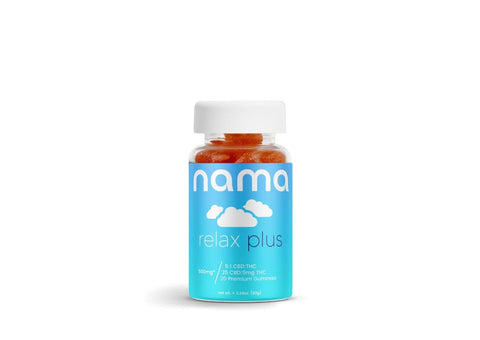
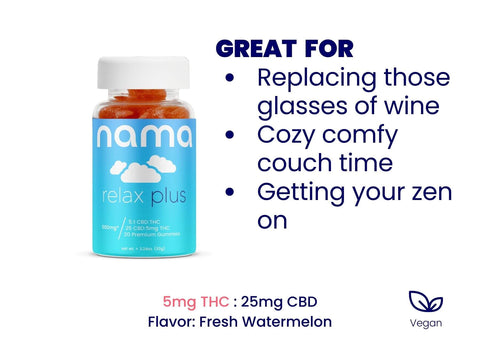
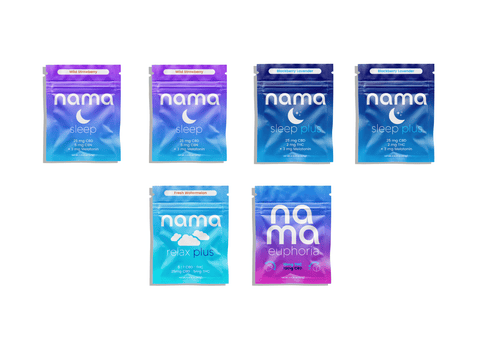
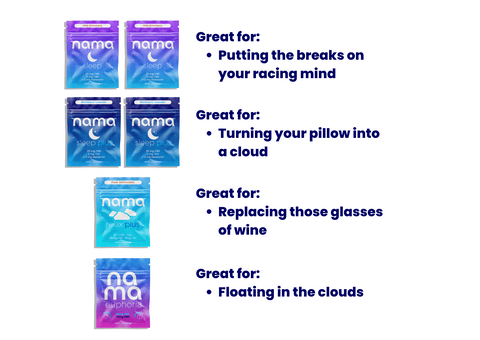


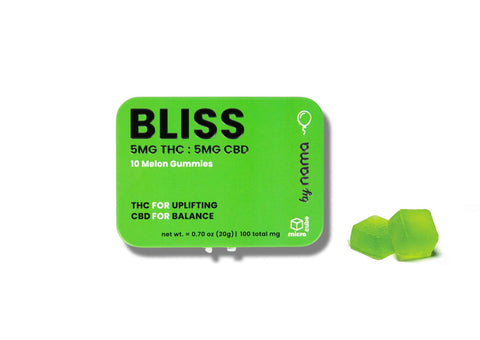
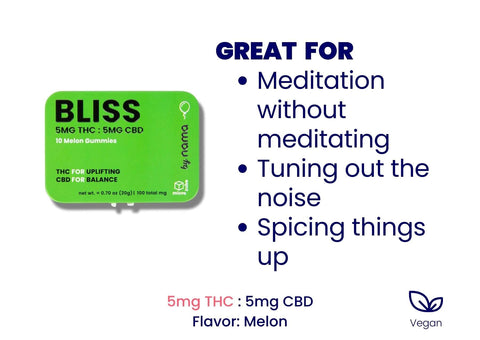
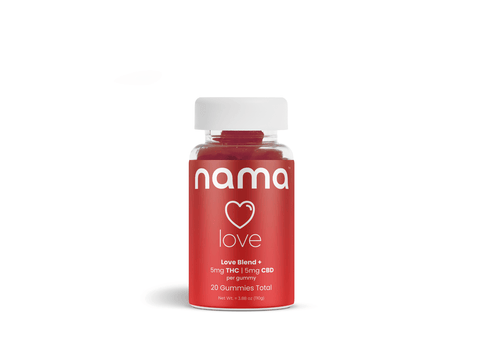
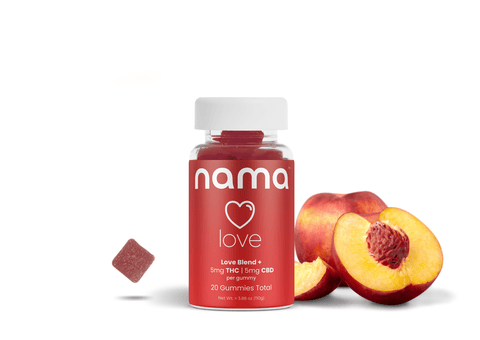
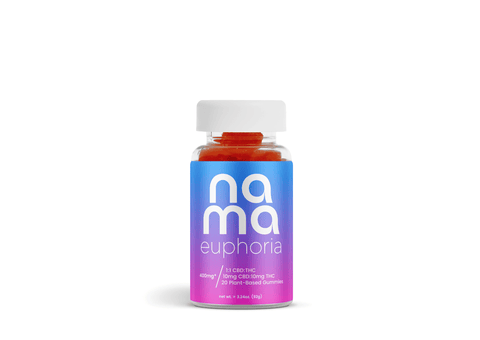
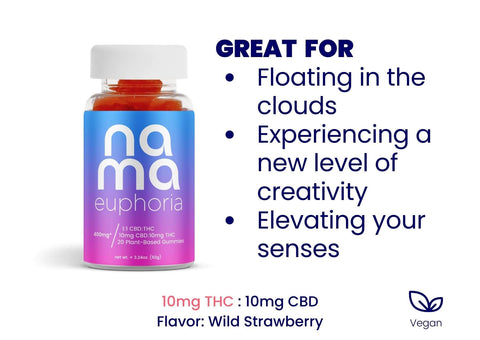







![Buzz Drops™ [THC Drink Drops]](http://www.namacbd.com/cdn/shop/files/nama_thc_buzz_drops.png?v=1711412866&width=480)
![Buzz Drops™ [THC Drink Drops]](http://www.namacbd.com/cdn/shop/files/buzz-drop-wine-comparison.png?v=1736882023&width=480)


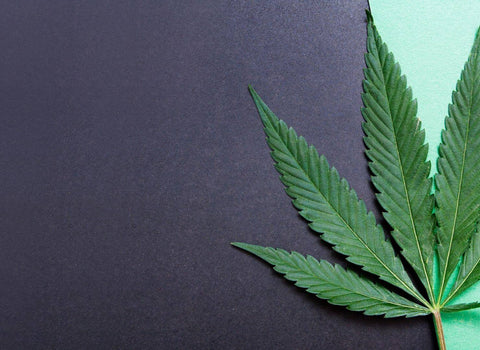
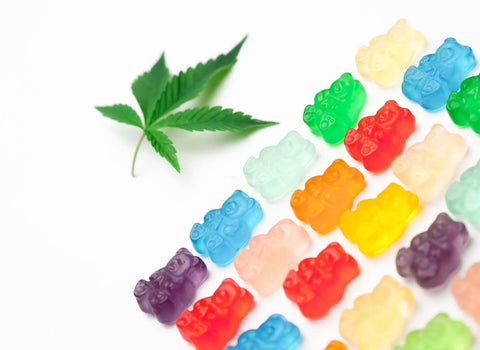

Comments (0)
There are no comments for this article. Be the first one to leave a message!